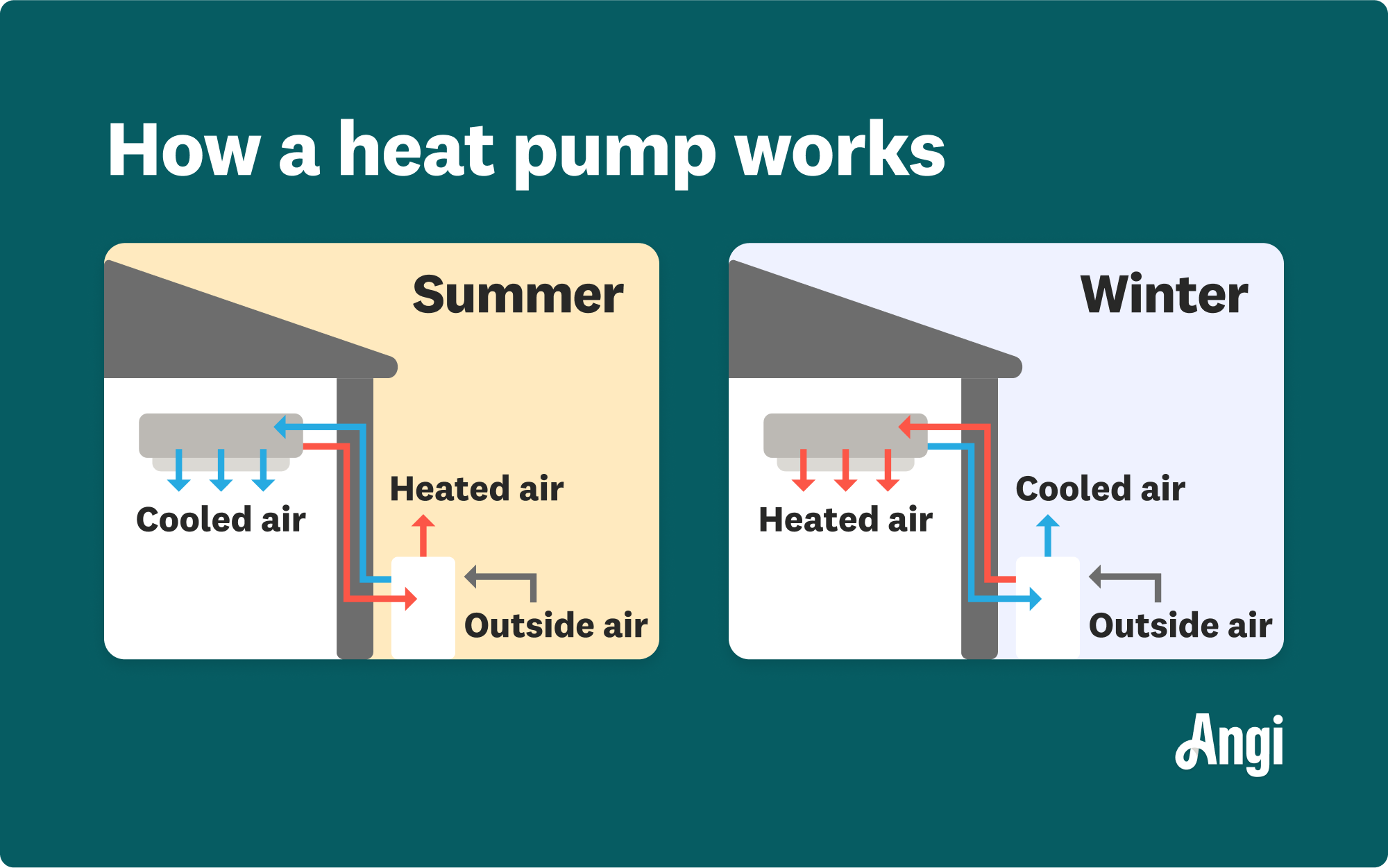What Is a Heat Pump and How Does It Work?
This is one hot HVAC option


A heat pump operates as one unit, but it can provide both heating and cooling.
There are four primary types of heat pumps: air-source, mini-split, geothermal, and hybrid.
Heat pumps are efficient, low-maintenance, and quiet.
A heat pump typically costs about $4,250 to $7,950 to install, but it will depend on the type you choose.
Whether you’re looking to heat a new addition to your home or just want to reduce your reliance on gas-powered systems, an electric-powered heat pump can provide a compelling primary or supplemental heating option. So, what is a heat pump, and how does it work? A heat pump system is a single-unit alternative to a traditional HVAC system. Learn more about what a heat pump is and what makes it an ideal heating system.
What Is a Heat Pump, and How Is It Used?

A heat pump provides both heating and cooling to your home and is available as either a ducted or ductless system. Electricity powers a heat pump, so it increases your home’s energy efficiency without fossil fuel dependency. Heat pumps work best in less extreme climates (typically those that don’t drop below freezing in the winter) and offer a low-maintenance, money-saving option for heating your home.
Heat pumps run on a refrigerant that transfers heat. They work similarly to air conditioners, but heat pumps can reverse the process to heating mode and also warm your home. To warm your home, a heat pump intakes warm air, pulling the heat from the ground or air outside. To cool your home, the pump pulls heat from inside and transfers it outside.
Parts of a Heat Pump
Heat pumps feature five key parts that work together to either transfer heat or change the pressure of the refrigerant, resulting in either heating or cooling:
Indoor unit: The indoor unit has a fan and coil. The coil functions two ways: either as an evaporator or a condenser. After the heat transfers between the inside air and refrigerant, the fan circulates the air throughout your home.
Outdoor unit: This part of the heat pump contains a fan and refrigerant coil; heat transfers between the outside air and refrigerant.
Compressor: The compressor pressurizes and heats the refrigerant like an air conditioner compressor.
Expansion valve: The expansion valve depressurizes and cools the refrigerant.
Reversing valve: This valve helps you switch between heating and cooling by reversing the cycle.
Types of Heat Pumps
When considering different types of heat pumps, you should consider your current heating and cooling setup, the space available for an installation, and the heat pump's intended purpose.
Air-Source Heat Pump System
This heat pump is one of the easier types to install and is also the most common heat pump. The air-source heat pump has two parts—an indoor air handler unit and an outdoor heat pump unit—that process air as it passes between the parts. During the processing, the two units absorb and release heat.
Pros of Air-Source Heat Pumps
Typically less expensive to install than ground-source heat pumps
Relatively simple to maintain and repair
Can also work as an air conditioner in the summer
No need for a separate heating and cooling system
Cons of Air-Source Heat Pumps
Efficiency can decrease in very cold climates
Relies on outdoor air temperature, which can fluctuate
Mini-Split Heat Pump System
This is another air-source heat pump; however, it’s different because it’s a ductless version. It functions similarly to the standard air-source heat pump system but doesn’t require ductwork to distribute the air. It works well for home designs that don’t have ducts or require smaller retrofit options.
Pros of Mini-Split Heat Pumps
Highly efficient and cost-effective for heating and cooling individual rooms or zones
Provides flexibility for customized temperature control in different areas of a building
Easy to install without the need for ductwork
Typically quieter than most traditional types of HVAC systems
Cons of Mini-Split Heat Pumps
Higher up-front costs compared to traditional heating and cooling options for the same amount of space
May require professional installation, especially for larger or multi-zone systems
Multiple indoor units may affect the aesthetics of the space
Regular maintenance is necessary for optimal performance and longevity
Ground-Source (or Geothermal) Heat Pump System
Also known as a geothermal heat pump, this type of heat pump pulls heat from the ground to help heat your home during the cooler months. Then, when the season changes and you need cooling, the ground-source pump cools the air before distributing it into your home.
Pros of Ground-Source Heat Pumps
More energy efficient in extreme climates
Longer life span compared to air-source heat pumps
Uses the naturally stable underground temperatures of the earth
Cons of Ground-Source Heat Pumps
Higher installation costs
Requires more space for installation, such as a large yard or drilling for a vertical loop system
Not a DIY-friendly installation
Hybrid Heat Pump Systems
Also called dual fuel systems, hybrid heat pumps combine a heat pump with an additional heating source, such as a furnace or boiler. When temperatures fall below a certain level, the system automatically switches to the furnace or boiler. This setup is perfect for regions with consistently low temperatures below freezing and is compatible with both air-source and ground-source heat pumps.
Pros of Hybrid Heat Pumps
Ensures consistent heating capabilities
Efficient in both moderate and extremely cold climates
Reduces the need for fossil fuels
Provides flexibility and versatility in heating options
Cons of Hybrid Heat Pumps
Higher up-front cost compared to traditional heating systems
Typically require professional installation and maintenance
Additional components may require more space for installation
Requires a backup heating system
How Much Does a Heat Pump Cost?
Heat pumps can range in cost and are impacted by the type, installation materials, and your home’s design, square footage, and existing HVAC. The average heat pump cost ranges from $4,250 to $7,950. Once installed, yearly tuneups cost around $50 to $180. You can also expect to spend about $150 to $600 to hire a local heat pump repair pro.
Get your HVAC system serviced and inspected at least once per year. For extra peace of mind, call in a pro twice annually: once before the hottest months of the year and again before the coldest time of year.
Pros and Cons of a Heat Pump
Heat pumps might not be the right choice for every home since they have more requirements up front for installation and power. However, for a home with the right setup, heat pumps can be worth it, offering savings, efficiency, and dependability.
Pros
Heat pumps offer some significant benefits. Here’s how their pros stack up:
More energy efficiency: Because a heat pump transfers heat rather than generating it, it’s a more energy-efficient system. Heat pumps can reduce your household dependency on fossil fuels by running on electricity, equating to lower carbon emissions by 46% to 54%, according to a study by the Natural Resources Defense Council (NRDC). It may also be compatible with solar- or wind-powered energy.
Dependable heating: Heat pumps are a good heating choice for homes that don’t experience extreme winters, offering better humidity control and air quality than a traditional system. A heat pump also has a quieter operating system and removes the risk of a gas leak (since it’s electrically powered).
Cons
Here are a few of the top heat pump drawbacks:
Difficult to install: While a heat pump may be lower maintenance than a traditional furnace in the long run, it requires a more complex installation. For geothermal heat pumps, the installation requires outside groundwork a certain distance from your home, which may be harder to retrofit.
Upfront expenses: Higher installation costs may be a factor, especially for a geothermal unit. The labor to install the heat pump may vary depending on the complexity, amount of prep work, and installation time.
If you’re unsure whether your home would experience more of the pros or cons with a heat pump, you can consult a heat pump installer near you for more details and an evaluation.
Frequently Asked Questions
One option is to install a dual-fuel HVAC system, which pairs a traditional furnace with a heat pump. In this case, when temperatures drop and electricity is no longer economical, you can use a natural gas furnace. You may also want to consider a heat pump versus mini-split unit when going the ductless route.
Ultimately, you should consider the climate where you live and your existing home systems to determine whether a heat pump installation can benefit your home and provide additional value.
A heat pump is one of the most affordable and efficient ways to heat and cool your home. With its energy-efficient offerings, heat pumps offer financial kickbacks in a couple of different ways.
First, you can save up to $950 on your energy bills yearly, according to the U.S. Department of Energy. You can also apply for rebates (up to $14,000) through the Inflation Reduction Act’s High-Efficiency Electric Home Rebate Act (HEEHRA).





- Furnace Repair
- Air Conditioning Repair
- HVAC Repairs
- Furnace Installation
- Wood & Pellet Stove Repair
- Dehumidifier & Humidifier Repair
- Heat Pump Companies
- Swamp Cooler Repair
- Wood Stove Services
- HVAC Companies
- Commercial A/C Repair
- Geothermal Installation
- Air Conditioning Installation
- Boiler Repair
- 24 Hour Furnace Repair
- Geothermal Repair
- Heat Pump Repair
- Humidifier Installation
- Thermostat Repair
- Thermostat Installation
- Nest Installation
- Heating & Cooling
- Heating Repair
- Furnace Cleaning
- Furnace Tune-Up
- HVAC Technicians
- Subcontractors
- Furnace Maintenance
- Plumbing & Heating Companies
- Wood Stove Inspection
- Mini Split Installation
- Wall Heater Repair
- Duct Installers
- Is a Heat Pump Worth It? Pros, Cons, and Alternatives
- Do Heat Pumps Heat and Cool?
- Heat Pump Not Blowing Hot Air? 7 Issues That May Be the Culprit
- Heat Pump vs. Air Conditioner: What’s the Difference?
- What Size Heat Pump Do I Need? How to Calculate the Right Size
- Comprehensive Heat Pump Maintenance Checklist
- Geothermal Heat Pumps in Floor Heating: Pros and Cons
- 8 Common Problems With Geothermal Heat Pumps
- How Much Electricity Does a Well Pump Use? What You Need To Know for Your Home
- What Is A Geothermal Heat Pump? How It Works











